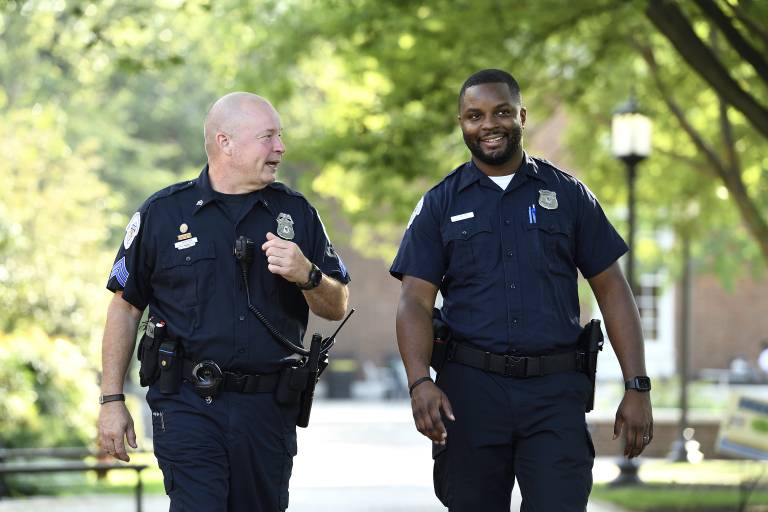Contacts
If you have further questions or concerns about expression on campus, these offices and individuals are available to speak with you.
Student Affairs Offices

If you are a student interested in organizing or engaging in protests, demonstrations, or other acts of expression, or you have other questions relating to expression and dialogue, you are strongly encouraged to seek support from the school-based student affairs offices.
Student Affairs Office Contact Information by School
Krieger School of Arts & Sciences: studentaffairs@jhu.edu
Whiting School of Engineering: studentaffairs@jhu.edu
Peabody Institute: peabodystudentaffairs@jhu.edu
School of Education: soe.studentaffairs@jhu.edu
East Baltimore
School of Medicine: SOMstudentaffairs@jhmi.edu
School of Nursing: SON-StudentAffairs@jhu.edu
School of Public Health: BSPH-studentlife@jhu.edu
Hopkins Bloomberg Center
Advanced Academic Programs: aapstudentservices@jhu.edu
Carey Business School: Carey.Student@jhu.edu
School of Advanced International Studies: SAISStudentAffairs@jhu.edu
School of Government and Policy: TBD
Office of Institutional Equity

If you ever experience discrimination or harassment, or witness someone else as a target, contact the Office of Institutional Equity at oie@jhu.edu or 410-516-8075. OIE has a team of professionals trained in assessing and investigating potential violations of the university’s policies on harassment and discrimination, including a Title IX coordinator for matters involving sexual harassment or sexual misconduct, and a Title VI coordinator for matters involving discrimination based on race, color, or national origin, including shared ancestry, anti-Semitism, and Islamophobia.
Public Safety
Johns Hopkins Public Safety is committed to safeguarding our vibrant learning and working community through holistic, progressive approaches to security that foster deep community relationships built on trust, cooperation, and mutual respect. Public Safety strives to ensure that Johns Hopkins is a place where students, faculty, and staff can enjoy rewarding academic and social experiences. Public Safety can be reached at: publicsafetyfeedback@jhu.edu or by calling 410-516-4600 (non-emergency) or 410-516-7777 or 911 (emergency).

Well-Being

Johns Hopkins has a wide range of resources and programs to support the well-being of its community members. Some resources that individuals may find helpful include:
Students and Learners
- The well-being website serves as a portal for all health and well-being resources across the university for students and trainees.
- If you or someone you know is experiencing a crisis, contact the Behavioral Health Crisis Support Team at 410-516-WELL (9355) to speak with a crisis support clinician.
- 24/7 counseling is also available through TalkNow. Visit timelycare.com/jhu and use your Hopkins email to log in.
- Student Outreach and Support helps students manage physical and mental health concerns, personal and family emergencies, financial issues, and other obstacles that may arise during their college experience. The office can be reached at studentaffairs.jhu.edu/sos, studentoutreach@jhu.edu and 410-516-7857.
- Religious and Spiritual Life promotes and supports spiritual development, theological reflections, religious tolerance, and social awareness among students, faculty, and staff within our Johns Hopkins community. Religious & Spiritual Life can be reached at: chaplain@jhu.edu or 410-516-1880.
- The Office of International Services (OIS) can be reached at ois.jhu.edu.
Faculty and Staff
- Any faculty or staff member in need of support or resources can contact the Johns Hopkins Employee Assistance Program (JHEAP). The JHEAP can be accessed in a variety of ways:
- Phone, 24/7: 888-978-1262
- Online (with 24/7 chat): www.myccaonline.com, Company Code: JHEAP
- Mobile App: CCA@YourService | Access Code: JHEAP
- Services are available 24 hours a day, 7 days a week, 365 days a year. You can speak with a mental health professional to provide an assessment, in-the-moment support, and connect to services when it’s most convenient for you. In addition, counseling services are available in the modality that works best for you, including video, telephonic, or in-person sessions. In-person visits are available both on-site in eligible work locations and in the community that is convenient to your home or work.





